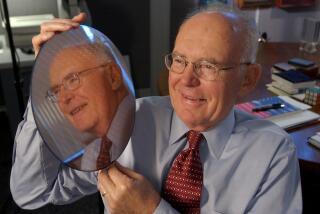As Science Finds Answers, It Uncovers Questions
- Share via
Throughout history, scientists were observers at the dance of nature. They could only watch, through their microscopes and telescopes, nature’s infinite diversity and wonders. In the next century, scientists will make the transition from being passive observers of this dance to becoming active choreographers. They will have the power to manipulate matter and life, almost at will.
This is not the “end of science,” as a recently published book has warned, but the beginning of an exciting new stage of science.
This remarkable transition is taking place because science has finally unlocked many of the fundamental secrets of matter, life and intelligence. The discovery of the atom and DNA and the creation of the transistor have led to revolutions in, respectively, quantum physics, molecular biology and computers. Although no one has a crystal ball, scientists can now sketch with reasonable accuracy the broad outlines of the future.
For example, one of the engines thrusting us into the future is Moore’s Law, which has held for the past 50 years and states that computer power doubles roughly every 18 months.
To illustrate Moore’s Law, Paul Saffo, a director of the Institute for the Future, observes that the singing greeting cards that we routinely throw away contain more computer power than all the Pentagon computers of the 1940s.
But by 2020, artificial intelligence will be cheap and ubiquitous. Your watch or jewelry, for example, may one day become an Internet node, capable of accessing the knowledge of an entire planet. Like electricity, intelligence will become invisible, yet everywhere.
Prototypes already exist of VCRs and appliances you can talk to, eyeglasses that can recognize your friends’ faces, cars that wake you up if you fall asleep at the wheel, and wall screens that access the Internet, but they are still expensive. With computer chips falling to a penny apiece by 2020, however, these marvels will one day become ubiquitous.
Because computers are also automating the laborious process of charting and sequencing the entire human genome, Moore’s Law is spilling over into biotechnology: Today, the number of genes that can be sequenced doubles every two years. (As of 1997, 843 million base pairs had been sequenced.)
Nobel laureate Walter Gilbert says that, in a few decades, any of us “will be able to pull a CD out of one’s pocket and say, ‘Here’s a human being: It’s me!’ ” This will revolutionize a visit to the doctor’s office. In the year 2020, your doctor may take a piece of your skin, and place it in a breadbox-sized device on the desk, which will spit out a CD with your name on it. This CD will be an “owner’s manual” for your body, with every single gene recorded.
The CD will list the 12 or so defective genes that all of us carry. So the doctor may give you a shot--not for chickenpox or measles, but to cure some of the 5,000 genetic diseases that have plagued humanity since the dawn of time, such as sickle-cell anemia, Tay-Sachs disease and cystic fibrosis.
Doctors of the future will look at radiation and chemotherapy the same way we look in horror at the arsenic treatments and bloodletting of the past.
All this raises a host of ethical questions. Computer experts fret about the impact of computers on the job market and the creation of “cyber-ghettos.” And what happens when, according to Moore’s Law, computers exceed the power of the human brain within 50 years?
Bioethicist Arthur Caplan believes the current acrimonious debate on abortion will be dwarfed by the coming controversy over “designer children.” What happens in a world when parents can decide on the sex and the genetic characteristics of their children, to make them taller, stronger, better-looking?
The future has indeed arrived, albeit unevenly. Unfortunately, most people are blissfully unaware of the revolution about to hit them. To put it bluntly, in the next century, we will have the power usually given to gods, the power to animate the inanimate, the power to create life itself. But if science will give us the power of a god, will we also have the wisdom of Solomon?
Unfortunately, wisdom cannot be dispensed from a coin machine. Wisdom only comes the old-fashioned way: We must earn it. First, we must arm ourselves with knowledge, and then begin a vigorous, democratic debate about these technologies. The solution is more debate and more democracy. There is no Moore’s Law for wisdom.
Kaku is professor of theoretical physics at the City University of New York and author of “Visions: How Science Will Revolutionize the 21st Century” (Anchor Books).






